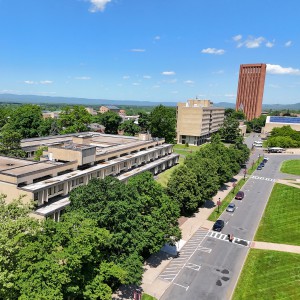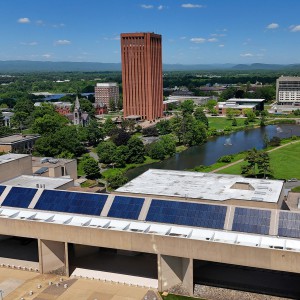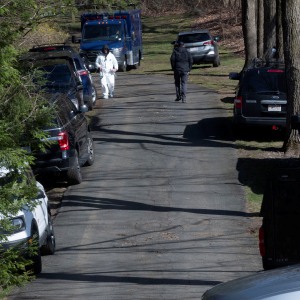Designer picked for geothermal project at Hopkins Academy

The Hadley School Committee has selected a Boston firm to oversee a deep energy retrofit project at Hopkins Academy. gazette file photo
| Published: 03-02-2024 5:01 PM |
HADLEY — A designer will soon be on board to oversee a project that could bring a geothermal heating and cooling system to Hopkins Academy, reducing the use of fossil fuels in the 70-year-old school building.
The School Committee at its Feb. 26 meeting unanimously chose Clough, Harbour & Associates, LLP of Boston to handle aspects of the deep energy retrofit and geothermal HVAC system conversion project. CHA, as the company is known, was one of four firms responding to a request for qualifications issued by Chris Desjardins, the district’s director of finance and operations.
A request for qualifications is not a bid and details about the cost of the work will be done through a contracting process, Desjardins said, explaining that the selection by the committee should be based on the vendor that is the best fit for the project.
Committee member Paul Phifer said the work to be done by the designer is not easy and there will be challenges in the process, but that he appreciates CHA has significant geothermal experience. “We’ll need somebody who’s not learning on the project,” Phifersauid.
Committee Chairwoman Humera Fasihuddin agreed that having a company with a level of experience in geothermal technology is vital.
The decision to proceed comes after the committee received a scoping study last summer, presented by UndauntedK12, an organization that helps schools across the country to move to zero-carbon emissions. That study outlined existing incentives and reimbursements from both the federal government, through the Inflation Reduction Act, and Eversource, as the local power supplier.
The scoping study shows four options for the 62,000-square-foot building that was built in 1954, including three air-source based and one ground-source based, ranging in price from $930,000 to $3.65 million. The least expensive two options, though, would still require fossil fuels to be used on site, and would require repairs to the current oil-based heating system. But after incentives from Eversource and in the federal legislation for the various options, the cost to the schools and town would go down to between $618,000 and $1.7 million.
Superintendent Annie McKenzie said there may be more opportunities for state funding for the project, including through an accelerated repair program for deep energy retrofit projects being considered by the Massachusetts School Building Authority, which has a committee studying whether to launch this program.
Article continues after...
Yesterday's Most Read Articles
 ‘Delightful’ Northampton store shopping guide Jane Hertz, 88, seeking next gig
‘Delightful’ Northampton store shopping guide Jane Hertz, 88, seeking next gig
 ‘Whole campus’ approach: UMass working to help six students whose visas, status were revoked
‘Whole campus’ approach: UMass working to help six students whose visas, status were revoked
 Five UMass Amherst students have visas, student status revoked
Five UMass Amherst students have visas, student status revoked
 Amherst finance director to return to UMass
Amherst finance director to return to UMass
 ‘Hands Off’ protest: 5,000 people in half-dozen Hampshire County communities protest against Trump policies
‘Hands Off’ protest: 5,000 people in half-dozen Hampshire County communities protest against Trump policies
 Long-vacant former Faces spot in Northampton gets new tenant
Long-vacant former Faces spot in Northampton gets new tenant
If such a program is a go in January 2025, Hadley could apply in April 2025, with a decision a short time later on being accepted and eligible for MSBA reimbursement.
This would fit the timeline for replacing existing systems at Hopkins between fiscal year 2026 to 2028, with the project to come for consideration by Hadley voters at a special Town Meeting warrant in fall 2025.
The project would then start in summer 2027, or perhaps that spring, delaying this part of the schools’ capital plan by 12 to 18 months, Mckenzie said. But she called it “very good news” that the town could save money through MSBA funding.
Desjardins said Hopkins is a challenging building to work on, with designers offering advice that windows might need to be replaced to accommodate the project, even though that happened 14 years ago. “So they’re going to have to work around that,” Dejardisn said.
In its application, CHA noted that while the existing systems have had some ongoing maintenance and repair work performed, they have not had any major overhauls or replacements. “As a result, the system is due for major replacement, and the Hadley Public Schools team has focused on a geothermal heating and cooling system as a top potential option.”
The company stated that in addition to the primary HVAC system replacement and associated building upgrade work, and electrical and architectural support services, CHA would also have to coordinate the project through design phases with a planned locker room renovation project, funded by Town Meeting and ballot votes last year, and a potential solar parking lot canopy project.
Scott Merzbach can be reached at smerzbach@gazettenet.com.






 FBI conducts court-authorized investigation at Hockanum Road home in Hadley
FBI conducts court-authorized investigation at Hockanum Road home in Hadley  Northampton takes aim at renter-paid broker’s fees
Northampton takes aim at renter-paid broker’s fees Q&A with UMass President Marty Meehan
Q&A with UMass President Marty Meehan
